The results of last Sunday’s socioscopy on luxury were so rewarding! When readers participate in my initiatives, responding with their own initiatives, creates an indirect, measurable dialogue that define anew the internet and its uses. This unexplored capacity, waiting to be tapped in countless creative ways, enthrals me. Your opinions were as always diverse, confirming, though, in majority, what I had in mind for luxury and its evolution as an ill-defined term from maximalism to minimalism.
First of all, let’s take a look at some qualitative perspectives, exactly as the participants expressed them in response to the question, “What is luxury to you? You are welcome to answer with a term, example, or anything else that comes to mind or heart.”:
“Luxury means to enjoy spontaneously and filterlessly”
“Essentialism and effortless intentionality; something that can’t be exactly reproduced in scale”
“To be able to appreciate the small things in life”
“To have access to authenticity, through unspoiled experiences”
“Rich, elegant, refined, expensive, comfort, extravagant”
In a more predefined context with single choice selection, your answers were somewhat similar:
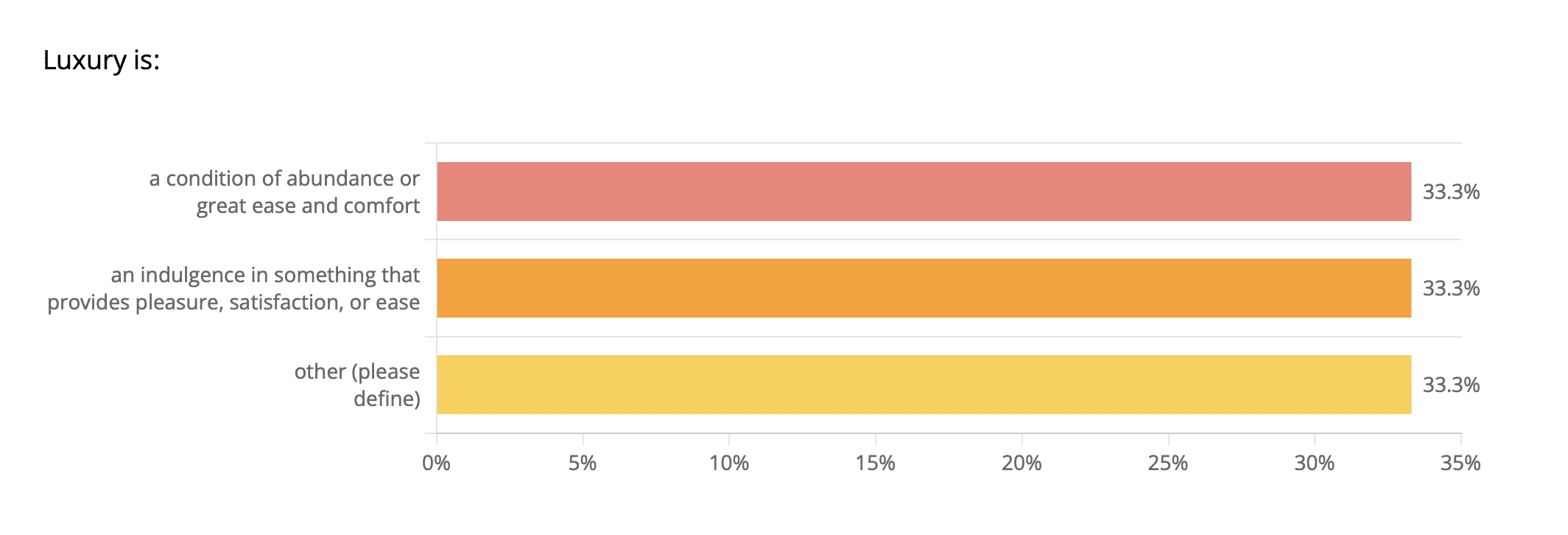
Whereas there are answers that connect luxury to richness and quantitative abundance, the majority of them concentrate on the emotional aspect of more qualitative characteristics. As you may have guessed, I agree with the latter; somehow, a state of maximalism never felt luxurious to me. On the contrary, I would say. If everyone wants to be rich, even if not everyone can actually be rich, it raises serious questions in my head for the exclusivity of the condition: somehow, if the majority desires something, it becomes less exclusive in my mind. To be honest, sure, I adore luxury, but my definition is nowhere near volumes.
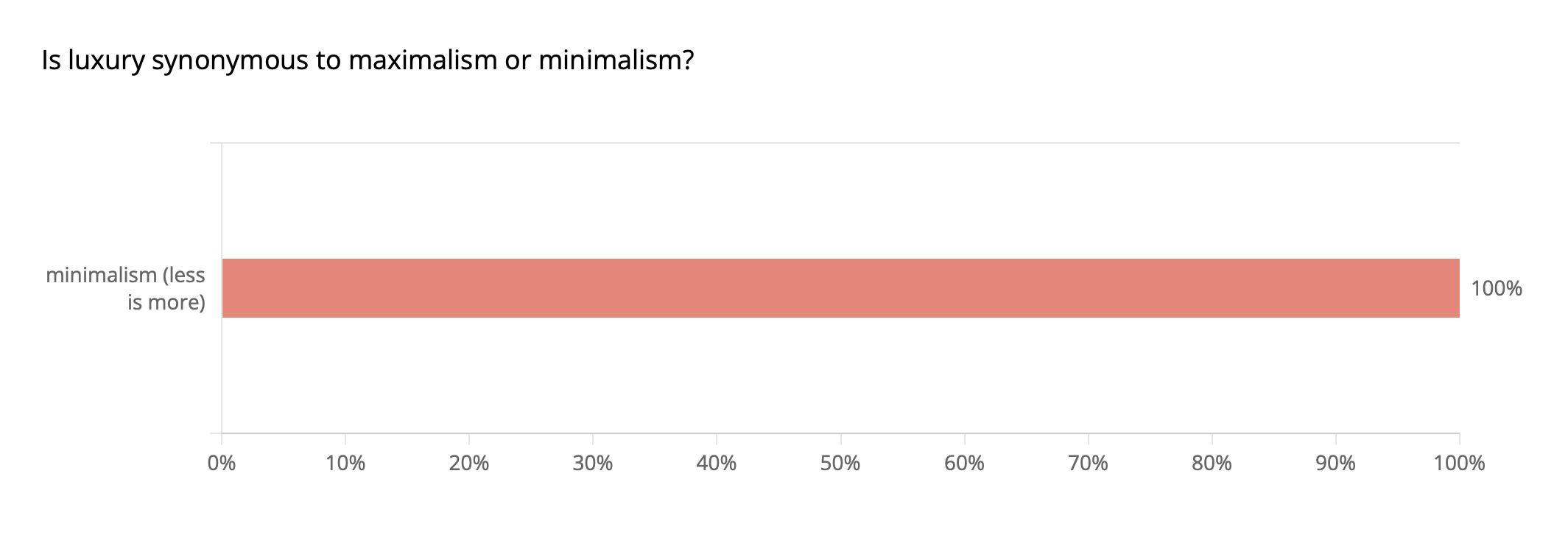
On the contrary, what speaks luxury to me in volumes is the scarcity and authenticity of an object or experience, irrespectively of its price. A great example of what I just described, is food: food doesn’t have to be ridiculously expensive to be luxurious, but it must be luxurious if it is ridiculously expensive. Most of the best foods I have tasted in my life, have come straight out of orchards in the middle of nowhere, build-in ovens in traditional farm houses, or makeshift fire pits in the ground. On the other hand, many have been the times I have paid good money for bad meals that failed to satisfy any of my senses.
What differentiates the occasions I just described, besides an established personal preference for the rural purity, is the spontaneity and unrepeatability of the former versus the predictability and repetitiveness of the latter. Deep in my heart, I hope that maybe the time has come for us to consider that we can’t bottle irrelevance in a small, expensive container and expect it to sell just because we label it as luxurious. Capitalism has grown so much towards a type of abundance disoriented from primary needs, that feels more and more dissonant to everyday life; admittedly, this is an observation we all made more or less during the pandemic.
As evident from your responses to the socioscopy, our definition of luxury has definitely changed over the years, but it also suffered a major transformation during Covid-19:
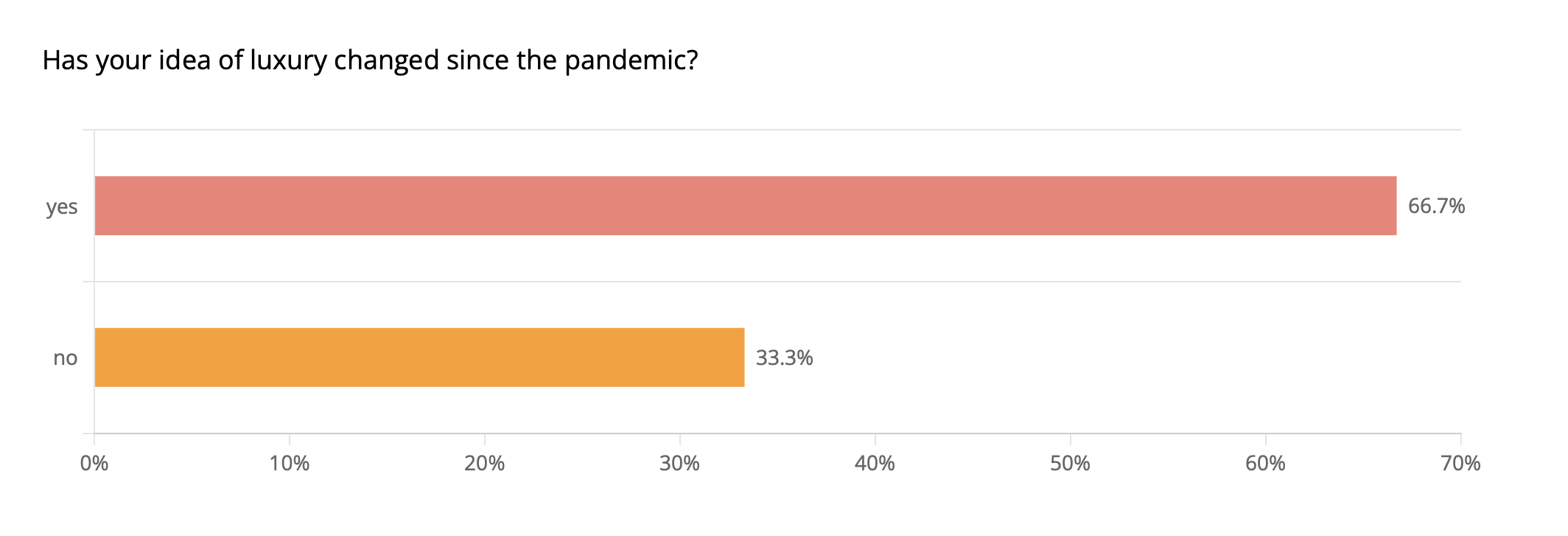
So, the next question is, where do we go from here? The learnings we acquired from our unprecedented, extensive isolation and inevitable retrospection, are more than enough to give us an indicative direction. Among others, I would prioritise luxury as both a state of mind and being, both as internal and external, and last but not least, both as tangible and intangible. Overall, if I had to guess, I would bet on services over objects, prioritising the intangible over the tangible. On a second note, I would leverage artisanship, especially marked by unpretentiousness and effortlessness.
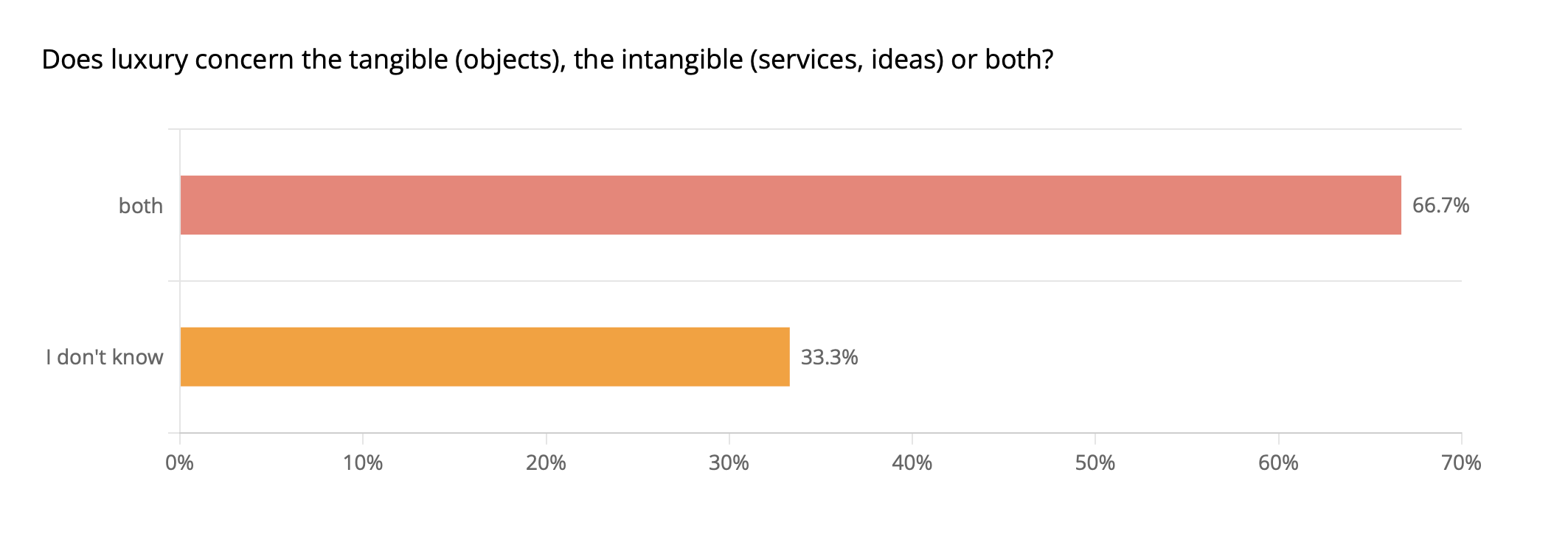
The reason behind this prioritisation is simple: we spent too much time alone with lifeless tokens; now, we are reasonably hungry for deep, sophisticated, emotionally awakening, collective experiences, in smaller or bigger parties. Consequently, the imminent momentum of luxury can transit from short-lived, grandiose, expendable moments, to long-term, sustainable, organic pleasure, rooted in the fine pleats of everyday life. The idea should be to focus on subtracting distractions to achieve essentialism within the ordinary, rather than adding commodities, resulting to live stressfully for the rare and extraordinary.
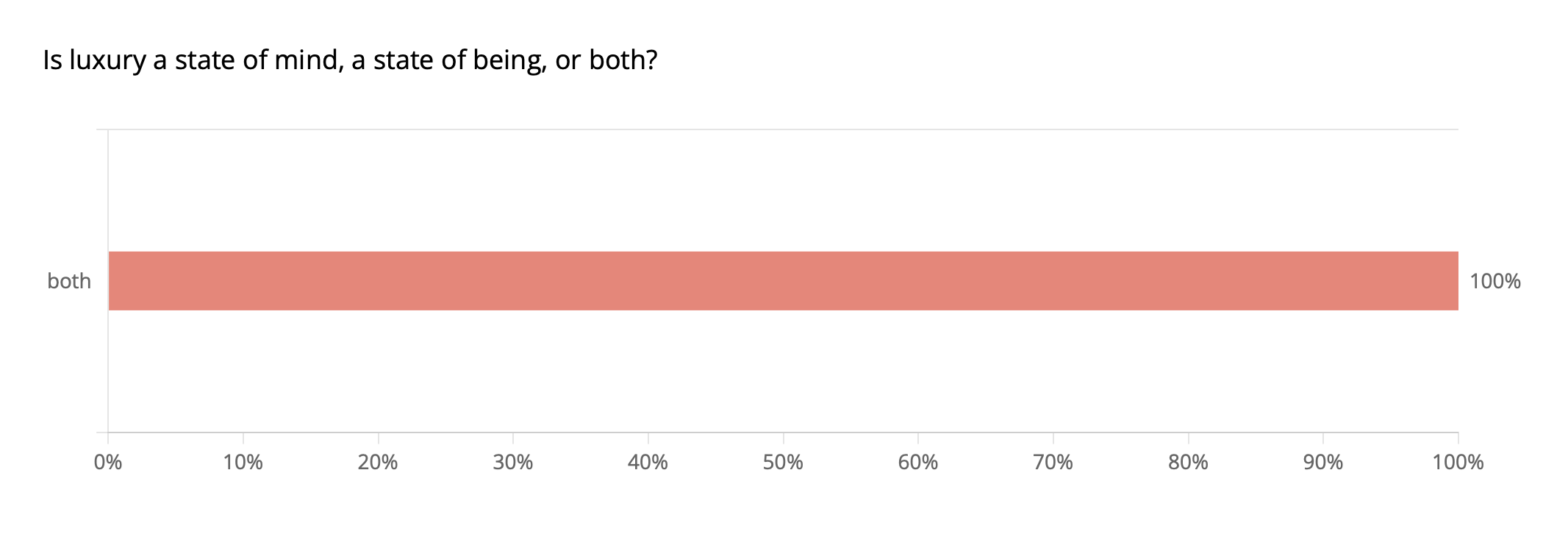
Ideally, irreplaceable will grow the experiences that are impossible to replicate, only because their impact within us becomes unique as it deepens through mindfulness, making us feel sufficient within our own sphere of existence. This process is internal, but potent enough to affect external manifestations of luxury. For example, the seasonality of luxury items, is a vivid indication of what an expensive in cost yet cheap in effectiveness thrill they are. The moment we assimilate this quality of theirs, they loose their allure in quantity. Of course, I don’t suggest we should be renouncing luxurious items altogether, rather than focusing on fewer but more essential items, by developing a more personal relationship with our objects and sustaining them through time.
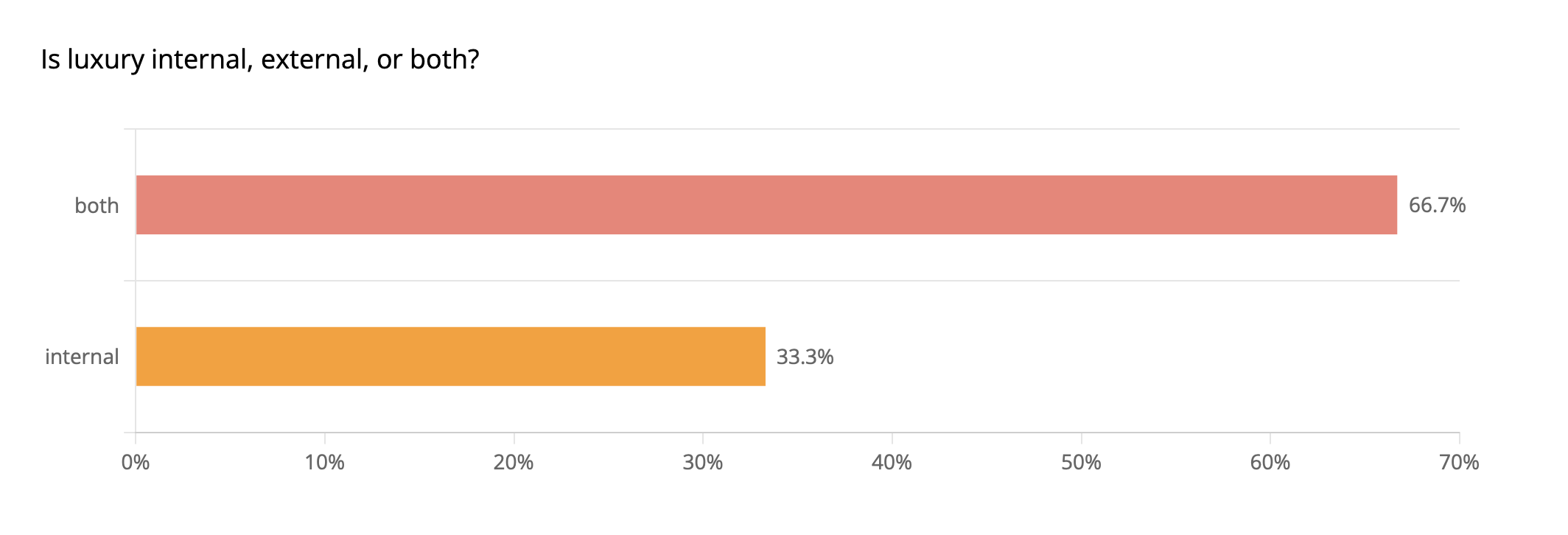
In reality, it’s like any other relationship; the qualities we love about our favourite people are few, but if we name them, note them, and treasure them, we have the power to sustain our feelings for longer. All this process, either internal or external, is described and consolidated through rituals. Rooting them deeply in our everyday, ordinary life, can transform our perspective and promote simplicity to an extraordinary sensation. For example, an everyday luxurious ritual of mine is skincare; a weekly one is lunch with my family; a monthly one is a getaway in nature. The list one can make is endless and open to creative experimentation.
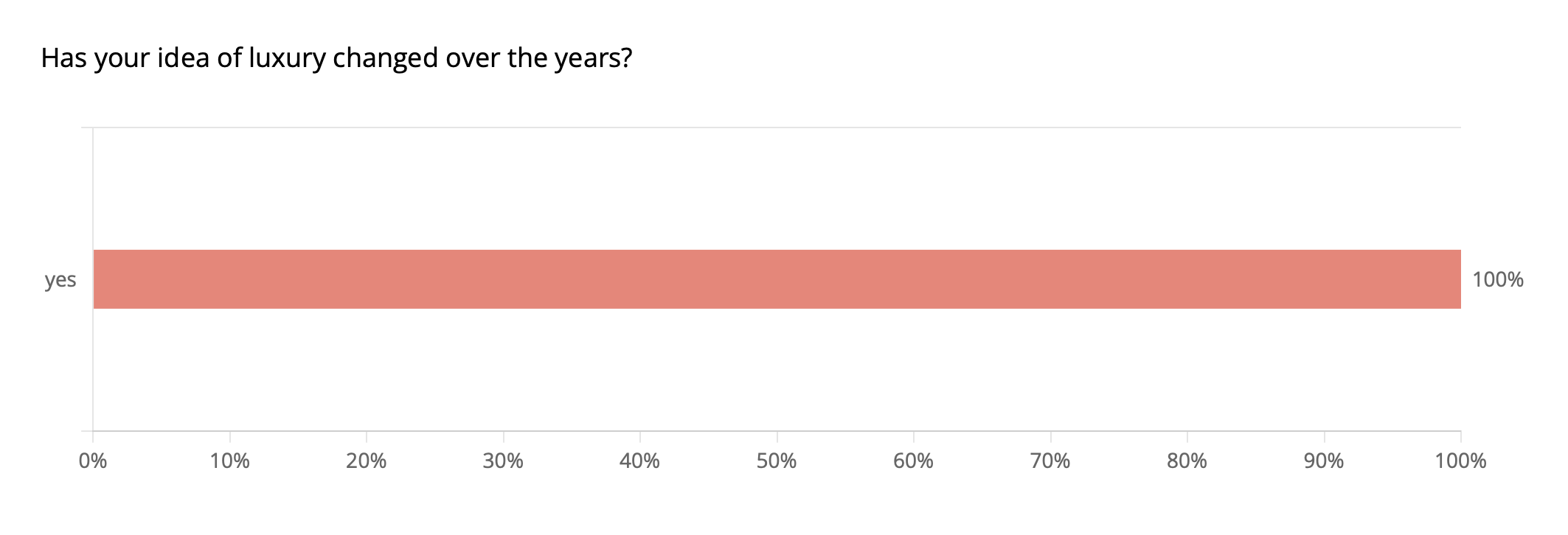
Ultimately, luxury is all about inside-out happiness, which of course can manifest in many forms. Indicatively, I would like to name a few we tend to forget or underestimate. Silence sits atop on my list. When was the last time you experienced an absolute absence of sound? One must go far from the external and internal chaos to immerse themselves in this breathtaking condition. Another one is unavailability. How many of you can actually switch off your phones, screen calls, ignore distractions and be essentially unbothered? I reckon very few can confirm this one.
Nudism is also a form of utmost luxury that I respect immensely. Being able to stand nude comfortably within one’s skin, primarily before oneself and secondarily before others, radiates a unique blend of authenticity and primitiveness that is hard to fake. The last entry I would like to note is oblivion to external expectations: understanding the difference between what is expected of me and what I am expecting mindfully from myself, can put someone in the driver seat towards a purposeful life, filled with rituals that celebrate one’s existence: this is yet another resurrectional experiment, potent enough to expose our higher self. Have a lovely Sunday.
liberalvirtue
library
internal literature
luxury: the evolution of an ill-defined term from maximalism to minimalism no1, liberalvirtue
external literature
Why we need to bring back the art of communal bathing, Aeon
We need highly formal rituals in order to make life more democratic, Aeon
Why the simple life is not just beautiful, it’s necessary, Aeon


